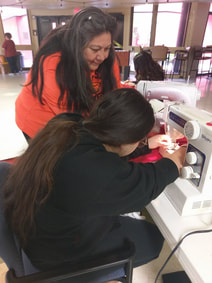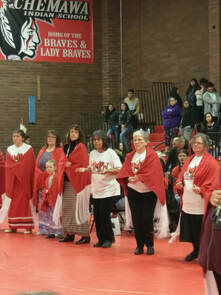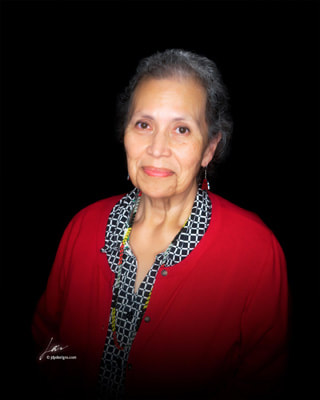 My Beloved Sisters and Brothers, This message comes to you as I officially step into retirement. This is my fourteenth year serving as Executive Director of the Native American Comprehensive Plan of the United Methodist Church. It has been my privilege to serve in this extension ministry appointment. I have experienced great joy with our Native American churches and communities as we have worshiped together, sung tribal hymns together, shared in baptisms, and Holy Communion services across the U.S. I have experienced the radical hospitality of our Tribal Peoples who fall at the bottom of the economic ladder yet give in the most sacrificial of ways. It has been an amazing experience to witness the increase in U.S. annual conferences forming Committees on Native American Ministries (CONAMs), even as we have strived to provide the training and consultation needed for these vital bodies to function according to their full potential. I pray for strengthening and growth of the CONAMs and that annual conferences recognize these valuable resources in their midst. I have witnessed firsthand the tremendous gifts and graces of my Indigenous brothers and sisters from Nations all across the U.S. We have amazing writers, musicians, preachers, teachers, professors, artists, adults, children, youth, elders, and on and on. I say to you, United Methodist Church, look long and hard at these faithful ones…realize what we have to offer and what you can learn from us…do not relegate us to invisibility or to the margins where we do not really exist until we serve a purpose in your worldview. To the Native and non-Native clergy and laity who serve in leadership for our Indigenous churches, I say thank you. To the Native and non-Native persons who serve in annual conferences, general agencies and UM organizations who stand with us, advocate for us and help to carry our voices into places where we cannot go, I say thank you. To local churches across the UMC who have shared resources and offered prayers for our ministry, I say thank you. This letter represents the first step of the next chapter in my ministry. Creator has put within me a spirit of optimism -- Despite the painful inheritance which most Indigenous Peoples share – an inheritance of displacement, forced migration, ancestral land loss and destruction, historical trauma, epidemic diseases of poverty, addiction and depression, the list goes on…despite this, I find hope for our future. I find hope that Creator God has made me in God’s own image, a person of color, a female, a tribal person, a descendant of Native American grandfathers and grandmothers who sacrificed that I might live. I am responsible to those who came before me and those who will come after me to live as a truth teller and respecter of traditional and ceremonial ways given to our many Peoples by the Maker of all creation. We have within our DNA a vision of what can be -- of the intricate spider’s web upon which we all have a place, and which puts us all in relationship with one another and with the Creator. I find hope that Creator God has not given up on us. Despite our struggle and frequent failure as humanity to “do no harm”, to “do good”, and to “stay in love with God”, God has not given up on us. The life, death and resurrection of Jesus Christ shows us the lengths to which our Creator will go to bring to life the reality of love, justice and hope both among us collectively and within us individually. I offer my love and prayers and look forward to the good things Creator God will do. Your sister in Christ, Anita
The Great Plains Annual Conference, which includes the former Kansas East, Kansas West and Nebraska conferences of The United Methodist Church, are working to establish a Committee on Native American Ministries (CONAM).
“We want the committee to be geographically diverse with the majority representation coming from Native American communities,” said Harrietta Reynolds, appointed by the conference to chair the committee. There are four Native churches in the conference according to GCFA data. “The work would include bringing awareness about Native American issues within our conference because there is so much that could be done.” Reynolds says the CONAM will be a sub-committee under the Mercy and Justice team. The Great Plains Annual Conference was the top giver to the Native American Ministries Sunday fund in 2016. The conference has also held an Act of Repentance Service in accordance with the 2012 General Conference mandate. Census data shows more than 50,000 Native people live in Kansas and Nebraska. “We hope to also build a data bank of Native American people across the conference who could serve beyond the committee to help educate and support Native ministries,” said Reynolds. The first organizing meeting for the CONAM is set for the end of March. Reynolds says their focus immediately will be on preparing resources to observe Native American Ministries Sunday. For more information about the CONAM contact Reynolds, hrepartner@ymail.com. 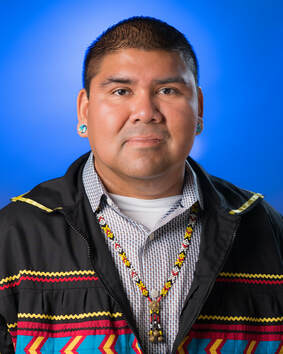 The board for the Native American Comprehensive Plan (NACP) has selected the Rev. Chebon Kernell as executive director of The United Methodist Church plan which seeks to support and serve Native ministries. “Chebon comes to us with a strong background in the mission of The United Methodist Church,” said the Rev. Fred Shaw, NACP board chair and director of the Native American Course of Study program. “He also has a firm advocacy for, and articulation of, Indigenous treaty rights and cultural integrity, and an often-witnessed personal risk-taking in working within and for Indigenous communities for justice and inclusion.” The Rev. Kernell, an ordained Elder in the Oklahoma Indian Missionary Conference, is currently the executive secretary of Native American and Indigenous Ministries for the denomination’s General Board of Global Ministries. In this role, he has worked with the World Council of Churches, the United Nations Permanent Forum on Indigenous Issues and the United Methodist Church’s Council of Bishops assisting in a denominationally mandated effort to improve relationships with Indigenous communities through dialogue, study and local or regional acts of repentance acknowledging harms inflicted upon Indigenous communities. He is an enrolled member of the Seminole Nation of Oklahoma and is of Muscogee Creek heritage. In 2016 he was honored by receiving the Religious Literacy Award sponsored by the Westar Institute “for his tireless efforts to educate the general public, including not only mainstream American Christians but also native peoples themselves, about the ‘deep and broad religious riches’ of Indigenous peoples in the context of reconciliation work and the recovery of native practices. “ He received his Bachelor of Arts in Political Science from Oklahoma City University and a Master of Divinity from Phillips Theological Seminary. He is a cultural practitioner and member of the Helvpe Ceremonial grounds. He has been married to Sara for 18 years and has five children Kaycee, Josiah, Raylen, and Solomon and niece Cali. Kernell will assume his role in mid-March following the retirement of the Rev. Anita Phillips. Phillips has served as executive director since 2006. “The United Methodist Church is indebted to Anita for the rich ministries of presence, inclusion, and education she has instilled within its mission,” said Shaw. “All of us who have served with her over these many years on NACP are grateful for her care, spiritual leadership, and ability to communicate across cultures.” 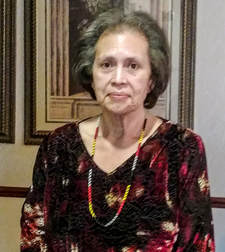 The Rev. Anita Phillips, executive director of The United Methodist Church’s Native American Comprehensive Plan (NACP), will be retiring effective Dec. 31, 2018. “My years with the NACP have been some of the best of my life,” said Phillips. “I am so thankful for having had this opportunity to serve God through walking with Native American churches and communities.” Phillips has served as executive director for 14 years. During her time she has led the denomination in efforts to create awareness about the value of Native Americans in The United Methodist Church; she has worked closely with Conference Committees on Native American Ministries to develop and support Native congregations; and she has also led workshops and training events to empower Native leaders. “Anita’s contributions to Native American ministries within the denomination will have long lasting benefits for the entire church,” said Fred Shaw, director of the Native American Course of Study and chair of the NACP. “We are grateful for her leadership and guidance and all that she has done on behalf of Native American United Methodists for more than a decade.” Phillips is an Elder in the Oklahoma Indian Missionary Conference and a citizen of the Cherokee Nation of Oklahoma. She is also the co-author (with Henrietta Mann) of On this Spirit Walk: The Voices of Native American and Indigenous People. The NACP Board plans to begin a search for a new executive director for the NACP by August 1, 2019. 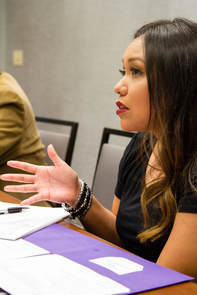 The Board of Directors for NACP for the 2017-2020 quadrennium includes United Methodist persons from many Indigenous Nations of the U.S. Serving in this important capacity are a total of eighteen persons, one of whom is a youth and three which are young adults. Included among this group are Deborah Screaming Eagle McNatt (Lenni-Lenape Nation) who is a youth leader in her community and local church; Bethany Printup-Davis (Tuscarora Nation of NY) who is a seminary student at Wesley Theological Seminary; Nikki Amos (Oklahoma Choctaw) who is a young adult leader in her local church and for her conference; and Kayleigh Vickers (Nanticoke/Lenni-Lenape) who is co-leader for a new Native American fellowship in her conference. These young persons offer their leadership for NACP in many ways, but among the most valuable is their insight and perspective in making the UMC and NACP relevant to the lives of Native young people today. 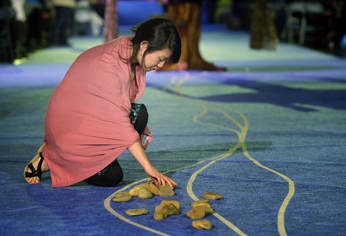 One of the questions frequently asked of NACP by United Methodists is “How can we engage in actions which reflect our genuine repentance and help us move toward healing relationships with indigenous peoples?” Our response is to become informed about Native American and indigenous peoples’ history and their relationship with the church. One of the resources available to help with this process is a book produced by NACP, On This Spirit Walk. This resource offers the voices of Native American and Indigenous United Methodists from a wide variety of nations and backgrounds. Their witness of what it means to claim both their Native and Christian identities is reflected in a series of essays relating to themes of importance within the Native/Indigenous context. These themes include values, history, worship, repentance, identity, justice and more. On This Spirit Walk is written as a small group resource which has been used by local churches, Bible study groups, UMW circles, and as a study focus for annual conference sessions. This book is published and sold by NACP, with proceeds benefitting NACP ministries with Indigenous Persons. It is available at the cost of $12 per copy which includes the cost of shipping. To place an order for On This Spirit Walk, contact Cheryl Hensley at nacomp@prodigy.net. 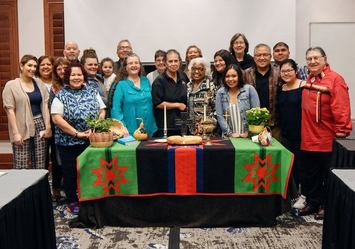 The NACP, in partnership with Path One/New Church Starts of Discipleship Ministries, commissioned a research study on the “state of Native American ministries and churches” in the U.S. Communications consultant, Ginny Underwood (Comanche-Kiowa), has begun the first phase of work on this new project and presented an Executive Summary of the research completed thus far at the NACP board meeting held April 5-7 in Dallas. Titled “A Snapshot of Native American Ministries in The United Methodist Church,” a PowerPoint presentation outlined historical events that have shaped ministry today, the impact of the 2012 Act of Repentance by the General Conference, and emerging themes expressed by Native American participants of the survey. “The report has shed light on some very positive results of the Act of Repentance and it also tells us that our work to improve relationships among non-Native United Methodists and indigenous communities is far from over,” said the Rev. Anita Phillips, NACP executive director. “We plan to glean insights from the report that will inform our future NACP work and areas most ready for new church starts.” The NACP plans to make the report public in the coming weeks. 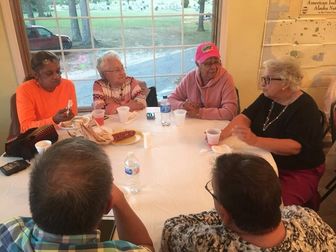 Vineland, New Jersey was the location of the quadrennial gathering for Annual Conference Committees on Native American Ministries (CONAM’s), held in October of 2017. These events are held during the first year of each quadrennium and was the fourth CONAM Conference sponsored by NACP. Focus of the conference includes sharing of best practices for working with Native American ministries within conferences, promotion of Native American Ministries Sunday, annual conference-CONAM relationships, and networking between CONAM members from across the five U.S. jurisdictions. Co-sponsor for the 2017 CONAM Conference was the Greater New Jersey CONAM who coordinated with leadership of the Nanticoke Lenni-Lenape Nation for a visit to the Tribal Grounds and worship at St. John UMC in Bridgeton, NJ. Participants were addressed by both Bishop John R. Schol and Lenni-Lenape Tribal Chair, Mark Gould. |
